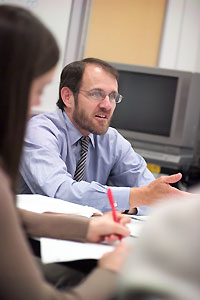  |
| HOME | THIS ISSUE | CALENDAR | GRANTS | BACK ISSUES | < BACK | NEXT > |
Medical professor taps basic science concepts in clinical educationby Pat Keefe - September 19, 2005 |
||||
|
Professor of medicine Dr. Dan Henry was first cited for his teaching in the late 1970s when he worked with Cornell medical students in New York City. He also earned the UConn Health Center’s Kaiser-Permanente Teaching Award for clinical excellence each year from 1993 through 1997, before he took himself out of the running.
Despite his obvious talent for teaching, Henry says he was surprised when he learned he was the 2005 Charles N. Loeser Award for Excellence in Teaching in the Basic Medical Sciences. The Loeser Award is presented yearly to a Health Center faculty member by second-year medical and dental students and is named in memory of anatomy professor Dr. Charles Loeser. Winners must possess scholarly curiosity; the ability to evoke in students an enthusiasm for learning; and a desire to give wholeheartedly of themselves to advance the welfare and education of their students. “Dan is an incredible teacher at so many levels,” says Dr. Bruce Koeppen, interim dean of the School of Medicine. “He is the only faculty member to win both the Loeser Award and the Kaiser Permanente Award. He can teach effectively across the entire curriculum of the School of Medicine. He is especially good at bringing together basic science concepts to explain clinical medicine.” Henry plays a big role in medical students’ education. He is course director for the multi-disciplinary ambulatory experience, an eight-month course for third-year medical students. He is a section leader for a third-year inpatient medicine course, and course director for a fourth-year advanced clinical experience. He lectures and holds many small group conferences for first- and second-year students in Human Systems I and II, and is a facilitator for Correlated Medical Problem Solving. In the past year, he has also taught Principles of Clinical Medicine, as well as clinical epidemiology in Human Development and Health. “I thoroughly enjoy working with medical students,” he says. “Years ago, I realized that if you work hard at teaching, are enthusiastic, and stimulate the students, you can have a big influence on them.” Henry’s inspiration as a teacher and a doctor came from a Vanderbilt pathologist, Dr. Robert Collins, who taught pathophysiology. “Pathophysiology is extremely important for doctors to take care of patients,” Henry says. “Patients have complex medical conditions and often multiple organs are affected. Doctors have to understand how the heart and kidneys interact when a patient has heart disease, or what’s happening with the heart and lungs. In treating a multi-system illness, the doctor has to know how diseases affect all organs.” Henry lectures frequently to first- and second-year students, but the small-group session using case-based education is the didactic experience he says he enjoys most. In the group, students are given cases: they then confer and ask questions. “The small-group interactions with the students are extremely enjoyable,” he says. “The sessions have enough time for students to ask questions, and there’s an opportunity to be open and to have a dialogue, rather than just one-way communication.” He uses the chalkboard when he lectures, and watches his students closely: “Using the chalkboard, you pace yourself, and you also see the audience reaction,” he says. “You can tell if they’re not getting something, which allows you to fix it.” Having to fix something also is a call for redefinition, he says. “If you realize they’re not getting your point, you need to reflect back on your lecture and change something. Hopefully you’ll improve and do better the following year.” Professors “usually know if they did a good job teaching or not,” he says. “If, after class, students come up and ask good questions, then you know. But if they come up and say they didn’t get this at all, you know you did a bad job!” Henry, a native of Tucson, Ariz., earned his medical degree from Vanderbilt. He did his training in internal medicine at New York Hospital Cornell Medical Center and then completed a nephrology fellowship at UCLA. He was then with Olive View Medical Center, an L.A. County hospital affiliated with UCLA. In that position, he was assistant program director, attending on nephrology and general medicine. He was also in charge of the UCLA medical students who did their third-year rotations at Olive View. For four years he ran the intensive care unit. He moved to Connecticut in 1991, and was assistant director of educational programs at St. Francis Hospital. He got involved with the medical school when he developed a one-month outpatient medical experience course for fourth-year students. Koeppen later asked him to chair the multi-disciplinary experience. Henry says medical students are a wonderful group of people. “The way they interact with each other, and their growth during the clinical years, how they interact with their patients – they’re just an outstanding group,” he says.“I consider myself fortunate to work with them.” |
| ADVANCE HOME UCONN HOME |

